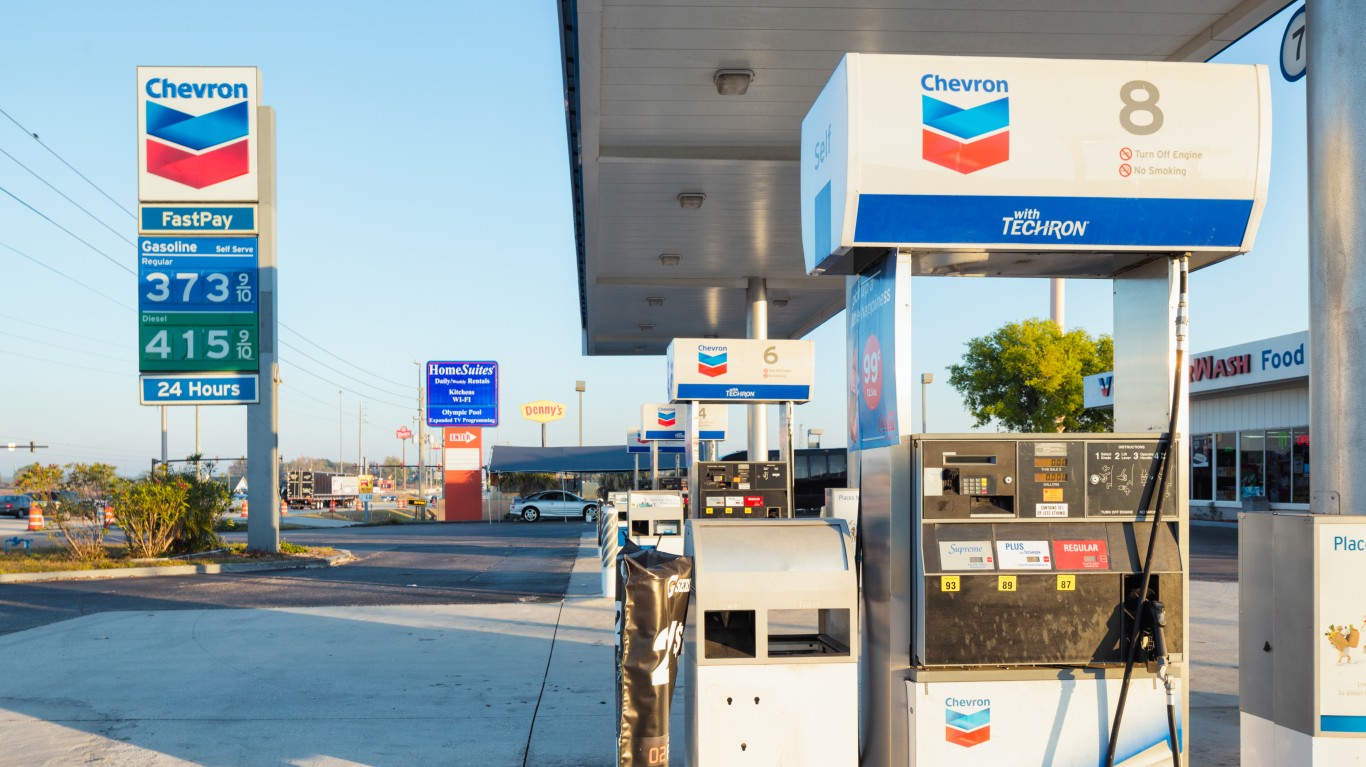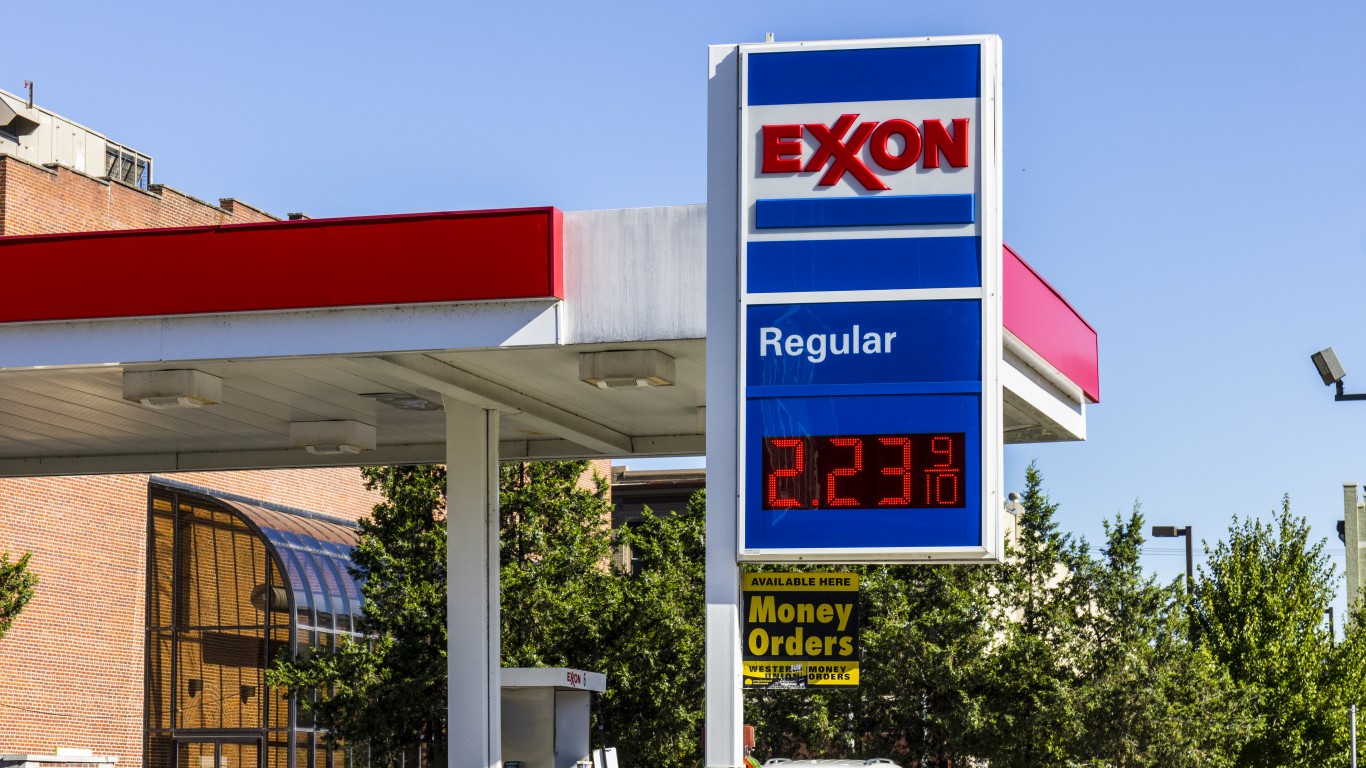Investing
Jefferies Says Buy Large Cap High-Yield Dividend Energy Giants Hand-Over-Fist

Published:

Investors love dividend stocks, especially the high-yield variety, because they offer a significant income stream and have massive total return potential. Total return includes interest, capital gains, dividends, and distributions realized over time. In other words, the total return on an investment or a portfolio consists of income and stock appreciation.
The energy sector lagged in 2024, closing up just 5.72%.
Large-cap integrated energy giants offer massive growth and income potential in 2025.
With interest rates expected to fall more in 2025, high-yield stocks make sense to own now.
Do you have dividend-paying energy stocks in your portfolio for 2025? Why not meet with an experienced financial advisor near you and see which ones make sense now? Click here to get started now. (Sponsored)
Here at 24/7 Wall St., we consistently emphasize the power of total return. This strategy can significantly boost overall investing success. Total return is the combined increase in a stock’s value and dividends. For example, if you buy a stock at $20 that pays a 3% dividend and rises to $22 in a year, your total return is 13%. That is, 10% for the increase in stock price and 3% for the dividends paid.
For 2025, we may see a 10% to 15% market correction after two years of 20% gains for the S&P 500. Large-cap integrated oil giants are trading at some of the cheapest levels in years and offer dependable and rising dividends. If investors have big gains in the Magnificent 7 stocks, it may make sense to peel some off and look at the top energy companies.
The energy analysts at Jefferies are very positive on four energy giants for 2025, including some of the biggest and the very best in the sector. All pay dependable high-yield dividends, and all have sizable upside to the Jefferies price targets.

Energy dividend stocks provide investors with reliable streams of passive income. Passive income is characterized by its ability to generate revenue without requiring the earner’s continuous active effort, making it a desirable financial strategy for those seeking to diversify their income streams or achieve financial independence.

This integrated giant is a safer option for investors looking to position themselves in the energy sector and pays a big 4.41% dividend. Chevron Corp. (NYSE: CVX) engages in integrated energy and chemicals operations worldwide through its subsidiaries. The company operates in two segments.
The Upstream segment is involved in the following:
The Downstream segment engages in:
It also is involved in cash management, debt financing, insurance operations, real estate, and technology businesses.
Chevron announced in late 2023 that it has entered into a definitive agreement with Hess Corp. (NYSE: HES) to acquire all of the outstanding shares of Hess in an all-stock transaction valued at $53 billion, or $171 per share based on Chevron’s closing price on October 20, 2023. Under the terms of the agreement, Hess shareholders will receive 1.0250 shares of Chevron for each Hess share. The transaction’s total enterprise value, including debt, is $60 billion. The deal was approved by the Federal Trade Commission in October and should close soon.
Jefferies has set a price target objective at $197 a share.

This large-cap integrated energy company offers investors substantial value and a solid 3.12% dividend. ConocoPhillips (NYSE: COP) explores for, produces, transports, and markets crude oil, bitumen, natural gas, liquefied natural gas, and natural gas liquids worldwide.
Conoco’s portfolio includes:
In November, the company completed its massive $22.5 billion purchase of Marathon Oil. Per the merger agreement, each share of Marathon Oil common stock was converted into the right to receive 0.255 shares of ConocoPhillips common stock at the adequate time of the merger, with cash instead of fractional shares.
Many Wall Street analysts, including the UBS team, feel Conoco can accelerate growth from a reloaded portfolio depth in the Bakken and Eagle Ford with visibility on future growth.
The Jefferies price target for the shares is a hefty $146.

The slow but steady increase in oil prices recently still offers investors an excellent entry point, and they will gladly grab a strong 3.67% dividend. Exxon Mobil Corp. (NYSE: XOM) is the world’s largest international integrated oil and gas company, exploring for and producing crude oil and natural gas in:
Exxon also manufactures and markets commodity petrochemicals, including olefins, aromatics, polyethylene and polypropylene plastics, and specialty products, and transports and sells crude oil, natural gas, and petroleum products.
Top Wall Street analysts expect the company to remain a key beneficiary in a higher oil price environment, and most remain very optimistic about the company’s sharp positive inflection in capital allocation strategy, upstream portfolio, and leverage to a further demand recovery. In addition, Exxon offers greater Downstream/Chemicals exposure than its peers.
Exxon has completed its purchase of oil shale giant Pioneer Natural Resources in a $59.5 billion all-stock purchase. The deal created the largest U.S. oilfield producer and guaranteed a decade of low-cost production.
The Jefferies team has a $140 price target for the shares.

This foreign energy giant offers investors a hefty 4.27% dividend and big upside potential Shell PLC (NYSE: SHEL) operates as an energy and petrochemical company in Europe, Asia, Oceania, Africa, the United States, and the rest of the Americas.
The company operates through six segments:
It explores for and extracts crude oil, natural gas, and natural gas liquids; markets and transports oil and gas; produces gas-to-liquids fuels and other products; and operates upstream and midstream infrastructure to deliver gas to market.
The company also markets and trades natural gas, liquefied natural gas (LNG), crude oil, electricity, carbon-emission rights; and markets and sells LNG as a fuel for heavy-duty vehicles.
In addition, it trades in and refines crude oil and other feed stocks, such as:
Further, the company produces base chemicals comprising ethylene, propylene, and aromatics, as well as intermediate chemicals, such as styrene monomer, propylene oxide, solvents, detergent alcohols, ethylene oxide, and ethylene glycol.
Shell also generates electricity through wind and solar resources; produces and sells hydrogen; and provides electric vehicle charging services.
Jefferies has set a $79.20 price target for the stock.
Four High-Yield Stocks With 7% and Higher Dividends Are 2025 Home Runs
If you’re one of the over 4 Million Americans set to retire this year, you may want to pay attention.
Finding a financial advisor who puts your interest first can be the difference between a rich retirement and barely getting by, and today it’s easier than ever. SmartAsset’s free tool matches you with up to three fiduciary financial advisors that serve your area in minutes. Each advisor has been carefully vetted, and must act in your best interests. Start your search now.
Don’t waste another minute; get started right here and help your retirement dreams become a retirement reality.
Thank you for reading! Have some feedback for us?
Contact the 24/7 Wall St. editorial team.